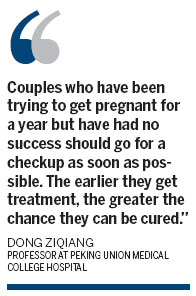Society
Heartache of childless couples
By He Na (China Daily)
Updated: 2010-09-21 08:39
 |
Large Medium Small |
Abortion caution
Couples who suffer primary infertility (meaning they have never been able to conceive) are usually left with only two realistic options: Adoption or in-vitro fertilization (IVF).
At the reproductive medicine center of Peking University's No 3 Hospital, the success rate for IVF treatments involving women between 25 and 35 is only about 50 percent. The rate drops to 30 percent for over-35s and 10 percent for over-40s.
"Couples who have been trying to get pregnant for a year but have had no success should go for a checkup as soon as possible," said Dong. "The earlier they get treatment, the greater the chance they can be cured."
Increases in the number of adolescent abortions could also lead to more secondary infertility (struggling to conceive after previously becoming pregnant) problems in the future.
A study of 1,236 sterility patients by Chongqing Family Planning Research Institute showed almost 60 percent of the women suffered infertility as a result of abortions or medical abortions (a non-surgical procedure using drugs).
"Advances in technology greatly alleviate people's suffering but also make people less alert," said Liu Ping, deputy director of the reproductive medicine center at Peking University's No 3 Hospital.
"Many women believe medical abortions are more convenient and safe but they can be more harmful (than traditional abortions)," he said. "Not only do they cause extensive bleeding and increase the risk of infection, they also affect the endocrine system, leading to irregular menstruation and influence ovulation."
The situation is even more hazardous at the unlicensed abortion clinics often used by teenagers and poor families.
A man from Qinghai province who did not want to be identified told China Daily his wife underwent two abortions and has now been diagnosed by doctors as sterile.
The couple, who wed in 2001, has visited almost every hospital in the far northwestern province and recently arrived in Beijing in the hope of finding a specialist who can help.
"We are both 37 years old and the chance of us having a child is very slim," said the husband. "We want to try IVF but the doctors say the success rate would be just as slim.
"Do we regret the abortion? Yes," he admitted. "If we hadn't gone through with them, my wife and I would have a child of 8 now."


Diets and disease
Although primary infertility is increasing at a relatively slow rate, sterility caused by environmental pollution has seen a rapid rise, particularly among men.
Statistics from the World Health Organization suggests the quality of sperm is declining, with the amount produced worldwide falling by 40 percent compared to that of 70 years ago.
"Food companies now rely on the extensive use of hormones and additives to improve the taste and color of products, such as poultry and out-of-season vegetables," said professor Yuan. "Meanwhile, water, air and heavy metal pollution all gradually affect people's health and fertility."
The shift toward more liberal views about sex, which some experts say has resulted in rampant prostitution, one-night stands and extramarital affairs, has also brought with it an increase in reported cases of sexually transmitted disease, another major cause of infertility.
Men can also damage their chances of reproducing by wearing underwear that is too tight or simply sitting at work for long hours.

Medical experts advise men and women maintain a healthy lifestyle by getting plenty of exercise and eating a balanced diet. However, psychology is also important.
"I've met many couples who have no problems at all but they are still finding it hard fulfilling their parents' dream (of having grandchildren)," said Liu at Peking University's No 3 Hospital. "It could be related to work pressure or mental stress."
Psychological stress can have a negative impact on a man's sperm count and a woman's ovarian function.
Infertility patients should learn self-regulation and maintain a positive and optimistic attitude toward life, advised Liu, who added: "Sterility is not fatal, so by releasing pressure and actively cooperating with treatment most patients can be cured."
For Chen and Wang in Shanghai, their determination finally paid off this year. After enduring five months of various Western and traditional Chinese treatments at Peking Union Medical College Hospital, the couple discovered in June that Wang is pregnant.